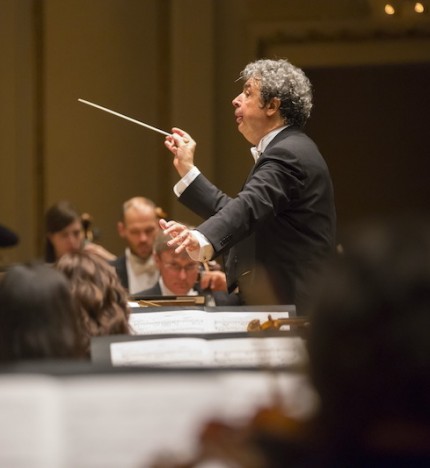Bychkov, CSO deliver strong and sturdy Bruckner

It’s always a bit dicey to claim a national interpretive style for a conductor based on the country of his birth. Yet in the case of Semyon Bychkov’s appearances this month with the Chicago Symphony Orchestra, it’s hard to resist. One could say that last week Bychkov conducted Shostakovich like a Frenchman and Thursday night he conducted Bruckner like a Russian.
Not that there’s anything wrong with that—especially considering Bychkov is Russian. And, indeed, there was much to admire in the performance of Bruckner’s Symphony No. 8, the sole work on a rare Thursday night Afterwork Masterworks program.
The Eighth is cast in the traditional four movements yet on an epic canvas running over 80 minutes. All of the Austrian composer’s elements are there—long-limbed melodies, stirring brass chorales, powerful climaxes and an expansive–some would say, leisurely–working out of his themes, culminating in a huge and complex contrapuntal finale.
The opening minutes were disfigured by a ringing cell phone from a clueless patron (lower balcony, row G), but soon the performance found its footing. Bychkov took a patient and refined view of Shostakovich’s Eighth Symphony last week but Thursday night he seemed on the opposite tack. This was a strongly projected performance from the get-go with bracing blasts of brass tone and a forceful straightforward take on Bruckner’s score.
Bychkov clearly knows what he is about in this repertoire, with skillful pacing and a clear, confident grasp of Bruckner’s sonic cathedral. Taking mobile tempos, the long first movement unfolded effectively yet rather swiftly—as if the cathedral tour guide was rushing us a bit to keep ahead of the next group. Tuttis were massive with stentorian trumpets yet notably well balanced even in the biggest fortissimos, and the CSO’s refined strings provided warmly rendered contrast. The Scherzo was quick and light-footed as well with some bold and fluent solo horn playing in the trio section by guest Richard Sebring, associate principal horn of the Boston Symphony Orchestra.
But the heart of any Bruckner Eighth is the vast Adagio, among the most elevated pages in all music, along with Mozart’s late operas and Wagner’s Parsifal. Bychkov’s direction was exemplary, eliciting transparent textures, pacing the long paragraphs skillfully, and drawing the requisite organ-like sonority from the strings.
Yet the essential spiritual dimension of this remarkable music was completely missing in action. There was zero mystery, much less otherworldly expression, to the violins’ theme. Played in a too “present” manner, without much nuance it sounded merely pretty and agreeable rather than the heart-stopping music of the spheres.
The finale was more successful, with strong and sturdy declamation, building inexorably to the triumphant final bars with the large brass forces—four of the nine horns doubling on Wagner tubas—blazing triumphantly at the coda.
A few passing ensemble slips apart the CSO played at their considerable best across all sections. If only some of the interior expression of Bruckner’s score has been probed as fully as the vaulting climaxes.
The program will be repeated 1:30 p.m. Friday, 8 p.m. Saturday and 3 p.m. Sunday. cso.org; 312-294-3000.
Posted in Performances





Posted Apr 26, 2015 at 2:05 pm by EddiebZeidman
I heard the Bruckner Eight at the CSO on Thursday night. One thing I would like to mention is that I felt the Orchestra sounding magnificent is due in part to the astounding acoustics of the symphony hall. Chicagoans take it for granted how huge music can sound in that Symphony Hall. The difference can be compared to seeing a movie in IMAX versus seeing it at a Cineplex.
Posted Apr 26, 2015 at 10:52 pm by Brad
I attended the Saturday night concert, and I left the hall stunned by the orchestra’s playing and the music itself. I noticed a few people in the audience wiping away tears during the performance, and I could hardly blame them. Bruckner 8 is a work of extraordinary power and emotional range, and the CSO clearly has the piece in its bones. Bychkov and the orchestra also seemed to uncover details I had never heard before, which added to the freshness and intensity of the interpretation. This was a moving, exceptional experience, and it’s not one I’ll ever forget.